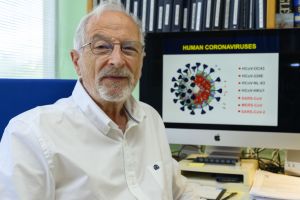Luis Enjuanes
Luis Enjuanes es profesor vinculado Ad Honorem de Virología y director del grupo de investigación en Coronavirus (replicación, interacciones virus-huésped y protección) del Centro Nacional de Biotecnología (CNB) del CSIC.
Lleva más de 35 años trabajando en coronavirus. Su interés actual es el estudio de los mecanismos de replicación, transcripción, virulencia e interacción virus-huésped de los coronavirus. Desde enero de 2020, su grupo está trabajando en una vacuna frente al SARS-CoV-2, aplicando la misma técnica que ya usaron en los brotes de SARS-COV, en 2002, y MERS, en 2012.
El laboratorio de coronavirus del CNB ya fue pionero en el mundo en el año 2000 al conseguir una copia de ADN del genoma del coronavirus que, por tanto, se puede modificar posteriormente, una herramienta que está al alcance de unos pocos laboratorios de todo el mundo para trabajar en la modificación genética de coronavirus. El objetivo del equipo de Enjuanes es localizar los genes de virulencia del virus para eliminarlos mediante modificación genética. Al eliminarlos se consigue una versión del virus atenuada, que más tarde se puede administrar como vacuna para que los pacientes desarrollen una respuesta inmune que les proteja en futuras exposiciones al virus virulento. Así están trabajando para obtener una vacuna frente al nuevo coronavirus, para la que esperan contar pronto con un prototipo.
Enjuanes ha publicado más de 235 artículos en revistas internacionales y 58 capítulos de libros. Además de Fogarty Visiting Fellow en los Institutos Nacionales de Salud (NIH) en EE UU, ha sido científico visitante en el Centro de Investigaciones sobre el Cáncer (FCRC) de los Institutos Nacionales de EE UU (NIH). Es profesor de Virología de la Universidad Autónoma de Madrid y del Instituto Pasteur de París. Ha sido nombrado Virólogo Senior Distinguido por la Sociedad Española de Virología, Académico de la Real Academia de Ciencias Exactas, Físicas y Naturales, y Académico de la Academia Norteamericana de Microbiología. Asimismo, es Expert Consultant de los NIH y de la Organización Mundial de la Salud, y ha sido editor jefe de Virus Research.
En el año 2020 recibió la Medalla al Mérito en la Investigación y en la Educación Universitaria concedido por el Ministerio de Ciencia e Innovación.






